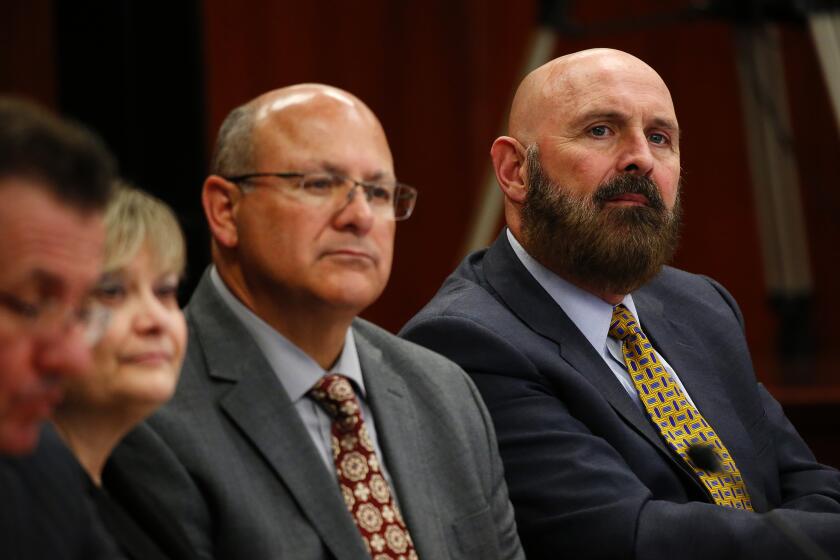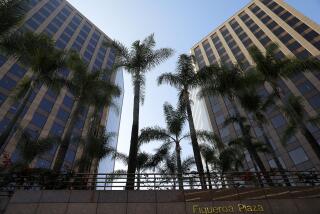‘Culture of corruption’: Former DWP cybersecurity chief gets 4 years in prison

- Share via
A federal judge on Tuesday sentenced the former official in charge of cybersecurity at the Los Angeles Department of Water and Power to four years in prison for lying to federal authorities.
David Alexander, 54, is the second city official to be sentenced in the federal corruption probe of the DWP and the city attorney’s office. DWP officials and attorneys working for the city took part in various crimes, including aiding and abetting extortion and bribery, according to prosecutors.
David Wright, the former DWP general manager, was sentenced in April to six years in prison for bribery.
U.S. District Judge Stanley Blumenfeld Jr. told the court Tuesday that Alexander lied and covered up his actions at the utility “with great ease.”
“He was part and parcel of the culture of corruption at the DWP,” Blumenfeld said.
Alexander, who was also ordered by Blumenfeld to pay a $50,000 fine, declined to comment to The Times after his sentencing.
David Wright, the former top executive at the Los Angeles Department of Water and Power, was sentenced Monday to six years in prison in a long-running federal corruption case.
Prosecutors said Alexander helped a company associated with Paul Paradis, a New York attorney who also has been implicated in the sprawling corruption scheme, secure work at the utility. Later, Alexander sought out a job for himself with Paradis’ company as he prepared to leave the DWP, prosecutors said.
Alexander served as the DWP’s chief information security officer from May 2017 to February 2019, then as cyber risk officer until August 2019.
Prosecutors said he used his position at the Southern California Public Power Authority, a consortium of utilities, including the DWP, to rig the bidding process in favor of a contract for Paradis’ company.
Alexander was the vice chair of the SCPPA cybersecurity working group and a member of the scoring committee. He both influenced the composition of the scoring committee and shared his scores with other members to persuade them to rate Paradis’ company favorably. In April 2019, the company was awarded a $17-million contract.
Get the lowdown on L.A. politics
Sign up for our L.A. City Hall newsletter to get weekly insights, scoops and analysis.
You may occasionally receive promotional content from the Los Angeles Times.
The DWP board later sought to rebid the contract through the utility. Alexander again undertook efforts to influence other members of the evaluation committee to rate Paradis’ company favorably. He sent Paradis a text about his plans to get the contract through, writing, “I know my job” with a laughing-crying emoji, prosecutors said.
In mid-July 2019, Alexander “proactively solicited employment” with the cybersecurity company. He sought from Paradis an executive-level salary, sign-on bonus and additional financial incentives to make up for the “early retirement penalty” he faced for leaving the DWP, prosecutors said.
By that point, Paradis was covertly working with the FBI and recording his conversations with Alexander, according to transcripts in the court filing.
The FBI raided the DWP on July 22, 2019. Alexander gave a voluntary interview to the FBI two days later in which he lied to investigators about his conversations and agreement with Paradis. During a second interview two days later, he lied again and falsely stated that he had declined any job opportunities with Paradis’ company, prosecutors said.
At Tuesday’s sentencing, Alexander’s attorney Nina Marino highlighted the timeline laid out by prosecutors in a bid to cast doubt on her client’s motivations. Before July 2019, Alexander’s “self-interest wasn’t the motivating factor,” Marino told the judge. Blumenfeld rejected that argument, saying the idea that Alexander was doing anything other “than setting the table” wasn’t plausible.
Blumenfeld noted that the former DWP official was entrusted with safeguarding security at the utility.
“The level of betrayal of that trust is almost unfathomable,” he said.
More to Read
Sign up for Essential California
The most important California stories and recommendations in your inbox every morning.
You may occasionally receive promotional content from the Los Angeles Times.












